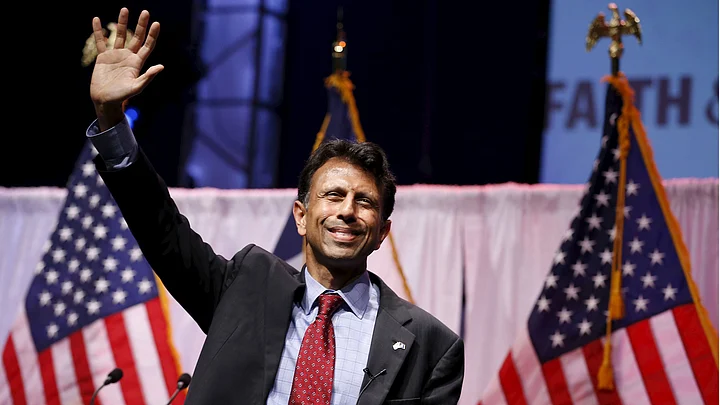Why this talk about de-hyphenation?
- Bobby Jindal, a policy wonk is trying to act out a public persona as an ultra-conservative
- ‘De-hyphenation’ that he’s All-American and not Indian-American seems to punctuate Jindal’s campaign so far
- Loudest voices of derision from Indian-Americans whose political inclination is towards the Left
- At 44, Jindal probably gets his career is headed downhill after being at a political peak
Louisiana Governor Bobby Jindal has spent recent days campaigning in Iowa, the state where corn is king and where, aptly enough, the first caucuses of the US Presidential election primary season commence. Jindal has been to The Fancy Fritter Restaurant in Monticello and held a press availability at the Foot and Ankle Specialists of Iowa.
Before he travelled to Iowa, he was in the Granite State, New Hampshire, where the primary bandwagon rolls into after Iowa. There, he doubled down (some would say dumbed down) on dehyphenating himself, as he said, “I’m tired of all the hyphenated Americans.” That assertion has appeared to punctuate his campaign so far: He’s all-American, not just Indian-American.
That version of identity politics though, is just part of the larger Jindal spiel. Jindal’s problem is that he’s a policy wonk, a former wunderkind who will dazzle listeners with his arguments, when delivered in small settings. But he’s trying to act out a public persona as an ultra-conservative, attempting to appeal to the extreme wing of the Republican Party.
But he’s just not coming across as a person who is comfortable in his skin, even the one he’s trying to adopt, like when he defends the controversial Confederate flag.
In the process, he may have garnered little traction but plenty of detraction. Like when his campaign tweeted out a Fourth of July photograph, one person snarkily retorted, “Really pathetic that family members of Jindal campaign have to retweet tweets. No one gives a damn about @BobbyJindal.” Incredibly enough, in attracting mockery Jindal even managed to trump The Donald.
Projecting ethnic background for political capital?
Obviously, the loudest voices of derision have sounded from Indian-Americans, who, when it comes to political partisanship, are reliably on the Left, firmly in the Democratic camp. So, they obviously want to paint him as an Uncle Tomar, a person of colour who has wandered off the reservation.
Jindal has always been irksome for this group, ever since he became just the second Indian-American member of the House of Representatives in 2004, more than 40 years after the first, Dalip Singh Saund, last sat in that chamber of Congress. He transgressed further by becoming the first-ever Indian American Governor of a state.
When I was in Baton Rouge the day Jindal was finally elected Governor in 2007, a local TV reporter asked me during an interview, what that meant for India and Indian-Americans. Not much really for Indians, I replied, but a coming-of-age for the community in American politics. That a Republican was a trendsetter may still irritate many liberals.
In that process, Jindal may have learnt that his ethnic background doesn’t make for political capital. In fact, when he first ran for Governor, his Democratic opponent dog whistled to white supremacists to snatch that election away from him.
A Lost Opportunity
But, I suspect, the actual reason for his new-found shrillness could well be the realisation that he may have lost his window of opportunity. He was lauded in 2012 for skipping the Republican National Convention to pay attention to the threat posed by a hurricane sweeping towards Louisiana. He was even the party’s choice to counter President Barack Obama’s first speech to the US Congress in 2009. He was, for many conservatives, a likely Presidential contender of the future, and always on the shortlist of commentators to be a running mate of former Republican nominees John McCain and Mitt Romney.
But then, his popularity in Louisiana went deep south. In an article headlined ‘How Bobby Jindal wrecked Louisiana’, conservative columnist Rob Dreher said, “I keep telling my friends in the national media that if you think Bobby Jindal has a chance in hell of becoming president, send a reporter down to spend a few days in Louisiana, seeing what condition he’s leaving his state in.”
At just 44, Jindal probably gets he’s already been at a personal political peak and now his career is headed downhill. His hatred for hyphenation is part of a pattern of desperate demagoguery to arrest that slide. But given current polling, he’s headed for also-ran status. And all the red meat rhetoric isn’t changing that in this electoral cycle.
(Anirudh Bhattacharyya is a columnist based in Toronto. He’s also the author of the humorous political novel, The Candidate.)
(At The Quint, we question everything. Play an active role in shaping our journalism by becoming a member today.)
